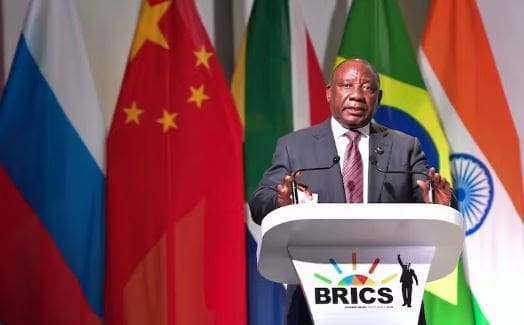With the United States’ decision to impose a 30% tariff on South African imports, the country must adapt quickly to a “turbulent trade environment”.
“The decision by the United States to impose a 30% tariff on South African imports highlights the urgency with which we have to adapt to increasingly turbulent headwinds in international trade.
“The US is South Africa’s second largest trading partner by country and these measures will have a considerable impact on industries that rely heavily on exports to that country and on the workers they employ, as well as on our fiscus,” President Cyril Ramaphosa said in his weekly newsletter on Monday.
The tariffs imposed by the USA sweep across countries around the world.
“It is important to understand that South Africa is not alone in facing high tariffs from the US.
“A number of export-reliant developed and developing economies, including several on the continent, are also grappling with these measures.
“The international trading system is changing. Complacency will not serve us, and building resilience is imperative. As government, we remain committed to ongoing engagement with the US and building trade resilience,” the President explained.
Complementary relations
He said relations between the two countries have been complementary, with sectors such as agriculture, automotive and textiles, benefitting from duty-free access to the US through the African Growth and Opportunity Act (AGOA).
AGOA is a trade agreement that provides eligible sub-Saharan African countries with duty-free access to the USA market for over 1 800 products, in addition to the more than 5 000 products that are eligible for duty-free access under the Generalised System of Preferences programme.
“South African exports do not compete with US producers and do not pose a threat to US industry. It remains our aspiration that this should continue. Largely, our exports are inputs into US industries and therefore support the United States’ industrial base.
“South Africa is also the biggest investor from the African continent into the US, with 22 of our companies investing in a number of sectors, including mining, chemicals, pharmaceuticals and the food chain,” the President said.
Furthermore, South African products imported by the USA “ultimately benefit US consumers in terms of both choice and cost”.
“By way of example, citrus production is counter-seasonal and does not pose a threat to US production. Furthermore, production by US companies has been on the decline for a number of years as the US sector grapples with low yields, a citrus greening disease and other factors unrelated to competition from imports.
“Imports from South Africa, the world’s second largest citrus exporter, have filled a gap and contributed to stable supply and prices for US consumers,” the President said.
Open communication
President Ramaphosa reiterated government’s stance that communications is ongoing between the two countries.
“As government, we have been engaging the United States to enhance mutually beneficial trade and investment relations. All channels of communication remain open to engage with the US.
“Our foremost priority is protecting our export industries. We will continue to engage the US in an attempt to preserve market access for our products. We must also accelerate the diversification of our export markets, particularly by deepening intra-African trade,” the President said.
READ | SA continues to engage US over tariffs
While that is ongoing, work to assist affected exporters is progressing, with the establishment of an Export Support Desk.
“We will in due course be announcing the modalities of a support package for companies, producers and workers that have been rendered vulnerable by the US tariffs.
“This intervention will also play a key role in guiding industries looking to expand into new markets in the rest of Africa, Asia, the Middle East and markets we already have trade agreements with,” he said.
READ | Government announces measures to assist exporters
Regional collaboration
To build resilience in the export market in the long-term, government will be seeking to strengthen regional value chains.
“Much as strengthening and establishing alternative value chains will take time, this moment presents us with an opportunity to push forward with the implementation and expansion of the African Continental Free Trade Area [AfCFTA].
“Reducing over-dependence on certain markets is a strategic imperative to build the resilience of our economy. It will also enable us to expand the frontiers of opportunity for South African businesses, goods and services.
“In the coming months, we will be scaling up our trade missions into new markets in Africa and beyond, as well as the National Exporter Development Programme whose aim is to grow the pool of export-ready companies,” President Ramaphosa said. – SAnews.gov.za
